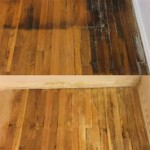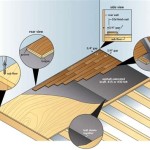Installing Bamboo Flooring: A Comprehensive Guide
Transform your home with the elegant and sustainable beauty of bamboo flooring. Installing bamboo flooring is a rewarding project that can add value and aesthetic appeal to your property. Here's a comprehensive guide to help you achieve a professional finish.
Materials Needed:
- Bamboo flooring planks
- Underlayment
- Moisture barrier
- Stair nose (if needed)
- Tapping block
- Pull bar
- Saw
- Adhesive
- Nail gun and nails
Step 1: Preparation
Begin by removing existing flooring, baseboards, and quarter-rounds. Ensure the subfloor is level, dry, and free of imperfections. Install a moisture barrier over the subfloor to prevent moisture damage. Next, roll out underlayment over the moisture barrier to provide cushioning and sound absorption.
Step 2: Acclimation
Allow the bamboo flooring planks to acclimate to the room temperature and humidity for 2-3 days before installation. This process helps prevent buckling or gapping.
Step 3: Starting Row
Determine the starting point of the installation and place the first plank in the corner with the tongue edge facing the wall. Use spacers to maintain a consistent gap between the wall and flooring.
Step 4: Joining Planks
Tilt the next plank slightly and insert the tongue into the groove of the previous plank. Use a tapping block and hammer to gently tap the plank into place. Continue this process, staggering the joints for strength.
Step 5: Cutting and Fitting
When you reach a wall or obstacle, measure and cut the necessary planks using a saw. Test the fit of the cut planks before securing them.
Step 6: Securing Planks
Depending on the type of bamboo flooring, you can secure the planks with adhesive, nails, or both. For glued flooring, apply adhesive to the tongue and groove edges and press the planks together. For nailed flooring, use a nail gun to drive nails through the tongues.
Step 7: Expansion Gap
Leave a small expansion gap around the perimeter of the room to accommodate natural expansion and contraction of the flooring.
Step 8: Trim and Moldings
Once the flooring is complete, install baseboards, quarter-rounds, and stair noses as needed to finish the edges and transitions.
Tips for Success:
- Plan the layout carefully to minimize waste.
- Use spacers consistently to ensure even gaps.
- Avoid installing flooring on uneven or damp surfaces.
- Allow ample time for acclimation to prevent warping.
- Clean the flooring regularly with a microfiber mop and bamboo floor cleaner.

4 Simple Ways To Install Bamboo Flooring On Plywood Wikihow Life

How To Install Bamboo Flooring Floated Diy Method

Beginners Guide To Installing Bamboo Flooring The Company

Beginners Guide To Installing Bamboo Flooring The Company

How To Install Bamboo Flooring Tongue Groove Over Underlay

Beginners Guide To Installing Bamboo Flooring The Company

How To Install Bamboo Flooring Part 1

Bamboo Flooring For Bathrooms 2024 Trends And Styles

How To Install Bamboo Flooring Tongue Groove Over Underlay

5 Challenges Installers May Face With Bamboo Flooring
Related Posts








